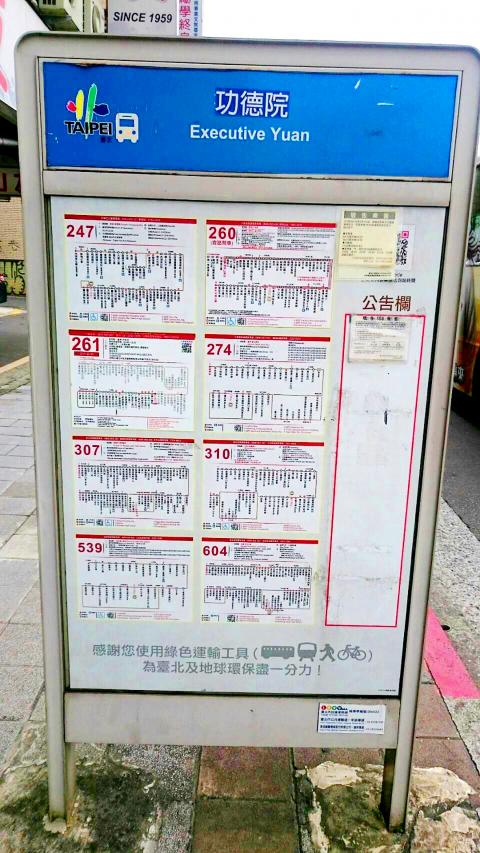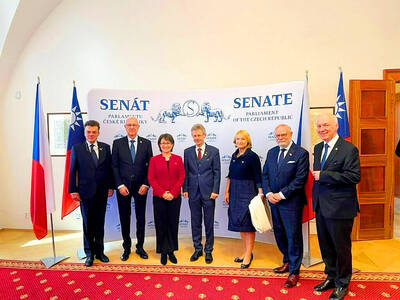A coalition of young campaigners has launched a movement to cover street signs for the Executive Yuan in Taipei with stickers that read: “Merit Yuan (功德院),” a sarcastic reference to Premier William Lai’s (賴清德) perceived dismissal of unreasonable working conditions for certain professions.
The movement was initiated by dozens of labor and student groups from universities including National Taiwan University, National Chengchi University, Fu Jen Catholic University, Soochow University and National Central University.
It is believed to have begun on Thursday evening, when campaigners affixed the stickers to street signs near the Executive Yuan compound, as well as signs that contain the words “Executive Yuan” at bus stops and MRT stations.

Photo: Huang Chien-hao, Taipei Times
The initiators yesterday said in a joint statement that the movement was launched to “rectify” the name of the Executive Yuan to align it with its current objectives, which are to provide a cheap labor force that works long hours and to make Taiwan a “paradise of overwork.”
“In the face of social problems, the government, instead of looking for solutions, has encouraged people to adjust their mindset and consider their unjust treatment as a way to earn ‘spiritual merit,’” the statement said.
They urged the Cabinet to refrain from using religious concepts as a short-term fix to the nation’s systemic problems and to work to ensure better working conditions and a fair distribution of wealth and long-term care resources.
The campaigners were referring to controversial remarks by the premier over the past two months.
In October, Lai dismissed calls for the task of capturing bees and snakes to be reassigned from firefighters to the Council of Agriculture, which would allow firefighters to better focus on handling fires, saying that duty can help them earn spiritual merit.
He used the phrase again last month, when he urged caregivers to look past their low salaries and treat their jobs as a way to earn spiritual merit.
To expand its reach, the movement’s initiators yesterday made the designs for the stickers available to the public and compiled a list of Taipei bus routes that stop at the Executive Yuan compound, calling on the public to join their efforts.
Asked to comment on the movement on the sidelines of the opening ceremony for an exhibition at Songshan Cultural and Creative Park, Lai said: “Young people are full of creativity and I am not bothered [by the movement].”
The Taipei Public Transportation Office said the signs at three bus stops had been tampered with, affecting 37 bus routes, but it had removed all stickers as of press time last night.
“Such actions not only make it difficult for passengers to recognize bus stops, they also undermine the public’s right to use public transportation,” the office said, adding that vandalizing bus stop signs and route maps contravene the Copyright Act (著作權法), the Civil Code and the Criminal Code.
Taipei Rapid Transit Corp said it has alerted MRT police, adding that those caught affixing the stickers would be fined NT$1,500, in accordance with the Mass Rapid Transit Act (大眾捷運法).

Two US House of Representatives committees yesterday condemned China’s attempt to orchestrate a crash involving Vice President Hsiao Bi-khim’s (蕭美琴) car when she visited the Czech Republic last year as vice president-elect. Czech local media in March last year reported that a Chinese diplomat had run a red light while following Hsiao’s car from the airport, and Czech intelligence last week told local media that Chinese diplomats and agents had also planned to stage a demonstrative car collision. Hsiao on Saturday shared a Reuters news report on the incident through her account on social media platform X and wrote: “I

SHIFT PRIORITIES: The US should first help Taiwan respond to actions China is already taking, instead of focusing too heavily on deterring a large-scale invasion, an expert said US Air Force leaders on Thursday voiced concerns about the Chinese People’s Liberation Army’s (PLA) missile capabilities and its development of a “kill web,” and said that the US Department of Defense’s budget request for next year prioritizes bolstering defenses in the Indo-Pacific region due to the increasing threat posed by China. US experts said that a full-scale Chinese invasion of Taiwan is risky and unlikely, with Beijing more likely to pursue coercive tactics such as political warfare or blockades to achieve its goals. Senior air force and US Space Force leaders, including US Secretary of the Air Force Troy Meink and

‘BUILDING PARTNERSHIPS’: The US military’s aim is to continue to make any potential Chinese invasion more difficult than it already is, US General Ronald Clark said The likelihood of China invading Taiwan without contest is “very, very small” because the Taiwan Strait is under constant surveillance by multiple countries, a US general has said. General Ronald Clark, commanding officer of US Army Pacific (USARPAC), the US Army’s largest service component command, made the remarks during a dialogue hosted on Friday by Washington-based think tank the Center for Strategic and International Studies. Asked by the event host what the Chinese military has learned from its US counterpart over the years, Clark said that the first lesson is that the skill and will of US service members are “unmatched.” The second

Czech officials have confirmed that Chinese agents surveilled Vice President Hsiao Bi-khim (蕭美琴) during her visit to Prague in March 2024 and planned a collision with her car as part of an “unprecedented” provocation by Beijing in Europe. Czech Military Intelligence learned that their Chinese counterparts attempted to create conditions to carry out a demonstrative incident involving Hsiao, which “did not go beyond the preparation stage,” agency director Petr Bartovsky told Czech Radio in a report yesterday. In addition, a Chinese diplomat ran a red light to maintain surveillance of the Taiwanese